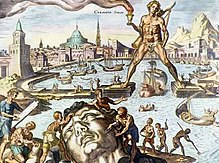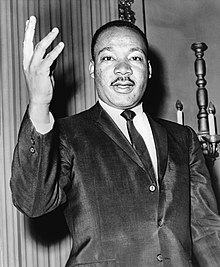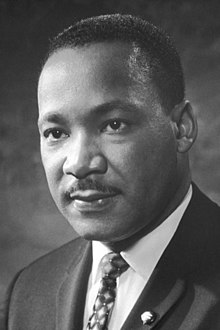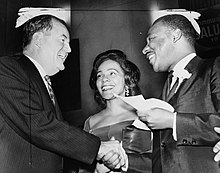Nonviolent resistance
Appearance
(Redirected from Peaceful protest)
- See also: Harmlessness, Nonviolence, Ahimsa, and Civil disobedience


Nonviolent resistance is the practice of achieving goals through symbolic protests, civil disobedience, economic or political noncooperation, satyagraha, or other methods, without using violence.

Quotes
[edit]- Soyez résolus à ne plus servir, et vous voilà libres. Je ne vous demande pas de le pousser, de l'ébranler, mais seulement de ne plus le soutenir, et vous le verrez, tel un grand colosse dont on a brisé la base, fondre sous son poids et se rompre.
- Resolve to serve no more, and you are at once freed. I do not ask that you place hands upon the tyrant to topple him over, but simply that you support him no longer; then you will behold him, like a great Colossus whose pedestal has been pulled away, fall of his own weight and break in pieces.
- Étienne de La Boétie, Discourse on Voluntary Servitude (1548)
- Resolve to serve no more, and you are at once freed. I do not ask that you place hands upon the tyrant to topple him over, but simply that you support him no longer; then you will behold him, like a great Colossus whose pedestal has been pulled away, fall of his own weight and break in pieces.
- What if men build a system on violence and injustice, on not doing good to those who hate them nor even to those who meekly obey and toil for them? And persist in this course through centuries of Christian history? ... In such a day, the pacifist is presumably not absolved from preaching to the rebels that they also shall reap what they sow; but assuredly not in such a wise as to leave the oppressors safely entrenched in their position.
- A. J. Muste, "Recent Gains in the Quest for Peace" in The World tomorrow Vol. 11, No. 1 (January 1928), p. 8
- [L]et it be granted that non-violent resistance can be effective against one's own government, or against an occupying power: even so, how does one put it into practise internationally? Gandhi's various conflicting statements on the late war seem to show that he felt the difficulty of this. Applied to foreign politics, pacifism either stops being pacifist or becomes appeasement.
- George Orwell, "Reflections on Gandhi" (1949), The Collected Essays, Journalism and Letters of George Orwell, Volume 4: In Front of Your Nose, 1945–1950 (Penguin, 1968), pp. 529–530.
- Buddhism ... is not a culture but a critique of culture, an enduring nonviolent revolution or “loyal opposition” to the culture in which it is involved.
- Alan Watts, Psychotherapy, East and West (1961), p. 7
- Thoreau's disobedience is disobedience as refusal. I won't live in your world. I will live as if your world has ended, as indeed it deserves to end. I will live as if my gesture of refusing your world has destroyed it.
- Curtis White, “The spirit of disobedience: An invitation to resistance,” Harper’s Magazine, April 2006, p. 36
- Similar though Marx and Thoreau may be in their accounts of the consequences of living in a society defined by money, their suggestions for how to respond to it are poles apart. Forget the Party. Forget the revolution. Forget the general strike. Forget the proletariat as an abstract class of human interest. Thoreau's revolution begins not with discovering comrades to be yoked together in solidarity but with the embrace of solitude.
- Curtis White, “The spirit of disobedience: An invitation to resistance,” Harper’s Magazine, April 2006, pp. 37-38


- The intellectual and moral satisfaction that I failed to gain from the utilitarianism of Bentham and Mill, the revolutionary methods of Marx and Lenin, the social contract theory of Hobbes, the "back to nature" optimism of Rousseau, and the superman philosophy of Nietzsche, I found in the nonviolent resistance philosophy of Gandhi. I came to feel that this was the only morally and practically sound method open to oppressed people in their struggle for freedom.
- When I went to Atlanta’s Morehouse College as a freshman in 1944 my concern for racial and economic justice was already substantial. During my student days at Morehouse I read Thoreau’s Essay on Civil Disobedience for the first time. Fascinated by the idea of refusing to cooperate with an evil system, I was so deeply moved that I reread the work several times. This was my first intellectual contact with the theory of nonviolent resistance.
- My Pilgrimage to Nonviolence. September 1, 1958
- Another way is to acquiesce and to give in, to resign yourself to the oppression... But there is another way. And that is to organize mass non-violent resistance based on the principle of love. It seems to me that this is the only way as our eyes look to the future. As we look out across the years and across the generations, let us develop and move right here. We must discover the power of love, the power, the redemptive power of love. And when we discover that we will be able to make of this old world a new world. We will be able to make men better. Love is the only way
- Loving Your Enemies, (November 1957)
- The non-violent Negro is seeking to create the beloved community. He directs his attack on the forces of evil rather than on individuals. The tensions are not between the races, but between the forces of justice and injustice; between the forces of light and darkness.
- Speech delivered in Finney Chapel at Oberlin College (7 February 1957), as reported in "When MLK came to Oberlin" by Cindy Leise, in The Chronicle-Telegram (21 January 2008)
- The best way to solve any problem is to remove the cause... Whenever racial discrimination exists it is a tragic expression of man's spiritual degeneracy and moral bankruptcy. Therefore, it must be removed not merely because it is diplomatically expedient, but because it is morally compelling... Injustice anywhere is a threat to justice everywhere... We must resist all forms of racial injustice. This resistance must always be on the highest level of dignity and discipline. It must never degenerate to the crippling level of violence. There is another way-a way as old as the insights of Jesus of Nazareth and as modern as the methods of Mahatma Gandhi. It is a way not for the weak and cowardly but for the strong and courageous. It has been variously called passive resistance, non-violent resistance or simply Christian love. It is my great hope that as the Negro plunges deeper into the quest for freedom, he will plunge deeper into the philosophy of non-violence... Our aim must not be to defeat or humiliate the white man, but to win his friendship and understanding. We must never become bitter nor should we succumb to the temptation of using violence in the struggle, for if this happens, unborn generations will be the recipients of a long and desolate night of bitterness and our chief legacy to the future will be an endless reign of meaningless chaos.
- The Rising Tide of Racial Consciousness (1960)
- I feel that this way of non-violence is vital because it is the only way to reestablish the broken community. It is the method which seeks to implement the just law by appealing to the conscience of the great decent majority who through blindness, fear, pride or irrationality have allowed their consciences to sleep.
- The Rising Tide of Racial Consciousness (1960)
- The non-violent resistors can summarize their message in the following simple terms: we will take direct action against injustice without waiting for other agencies to act. We will not obey unjust laws or submit to unjust practices. We will do this peacefully, openly and cheerfully because our aim is to persuade. We adopt the means of non-violence because our end is a community at peace with itself. We will try to persuade with our words, but if our words fail, we will try to persuade with our acts. We will always be willing to talk and seek fair compromise, but we are ready to suffer when necessary and even risk our lives to become witnesses to the truth as we see it.
- The Rising Tide of Racial Consciousness (1960)
- The beauty of non-violence is that is makes it possible for the individual to struggle to secure moral ends through moral means. Another thing about it is that is makes it possible for the individual to apply the love-ethic in the struggle for freedom and justice. It makes it possible for the individual to place love at the center of his life, and thereby transform a social situation. This is the beauty of non-violence, because hate is always injurious. It is as injurious to the hater as it is to the hated. Psychiatrists are telling us now of many of the strange things that have happened in the subconscious. Many of the inner conflicts are rooted in hate, and so they are saying now, love or perish. And the beauty of non-violence is that it is possible to fight war without violence, and it is possible to struggle for that which is right with love in one's heart.
- It is no longer a choice between violence and non-violence; it is either non-violence or non-existence. The alternative to disarmament, the alternative to suspension of nuclear tests, the alternative to strengthening the United Nations and disarming the whole world may well be a civilization plunged into the abyss of annihilation.
- Everyman is somebody because he is a child of God. And so when we say Thou shalt not kill, we're really saying that human life is too sacred to be taken on the battlefields of the world. Man is more than a tiny vagary of whirling electrons or a wisp of smoke from a limitless smoldering. Man is a child of God, made in His image, and therefore must be respected as such. Until men see this everywhere, until nations see this everywhere, we will be fighting wars. One day somebody should remind us that, even though there may be political and ideological differences between us, the Vietnamese are our brothers, the Russians are our brothers, the Chinese are our brothers; and one day we've got to sit down together at the table of brotherhood. But in Christ there is neither Jew nor Gentile. In Christ there is neither male nor female. In Christ there is neither Communist nor Capitalist. In Christ, somehow, there is neither bound nor free. We are all one in Christ Jesus. And when we truly believe in the sacredness of human personality, we won't exploit people, we won't trample over people with the iron feet of oppression, we won't kill anybody.
- A Christmas Sermon (1967) Sermon at Ebenezer Baptist Church in Atlanta, Georgia (24 December 1967)]

